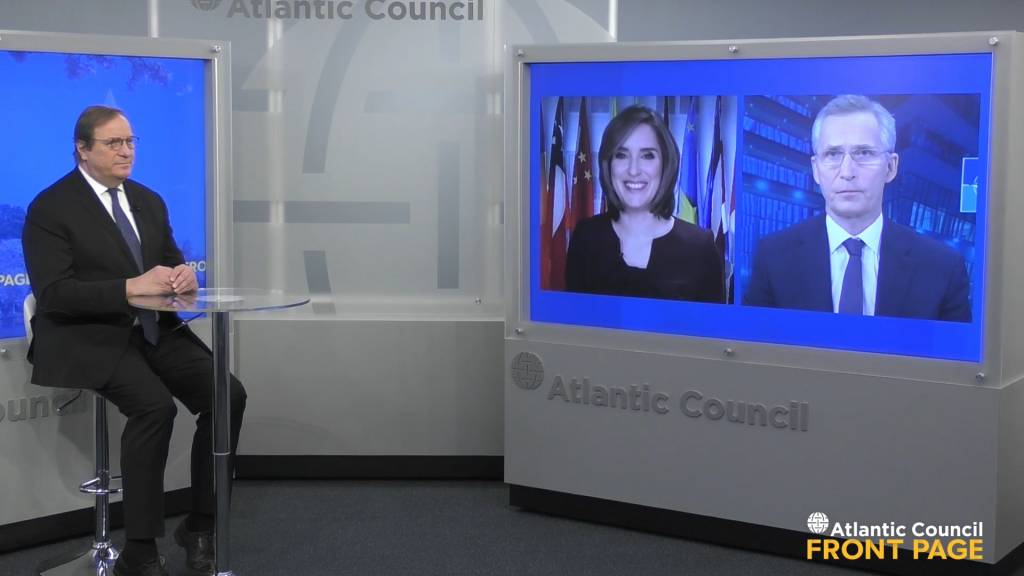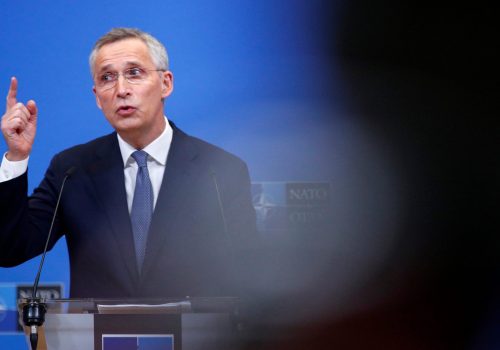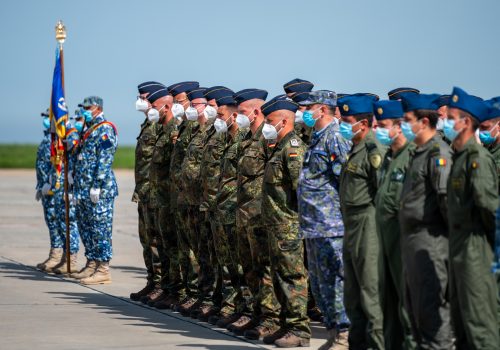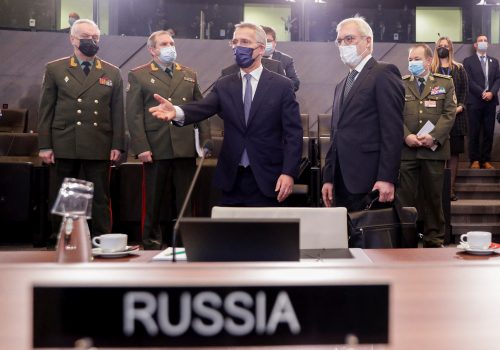As Western diplomats scramble to stave off what they fear could be another Russian invasion of Ukraine, NATO Secretary General Jens Stoltenberg believes the Alliance is fully prepared for however the Kremlin chooses to act next.
“We are ready to engage in political dialogue,” he told CBS News journalist Margaret Brennan in an exclusive Atlantic Council Front Page event Friday, “but we are also ready to respond if Russia chooses an armed conflict.”
In his first live interview since NATO delivered its official response to Russian demands to reorder Europe’s security architecture, Stoltenberg doubled down on the Alliance’s commitment to fortifying NATO’s eastern flank. But he also left the door open to further diplomacy—and made clear the Alliance wouldn’t send combat troops to Ukraine.
Here are more highlights from Friday’s high-profile Q&A (and read the full transcript here):
‘EVEN MORE NATO’
- Invoking Russia’s primary goal—to prevent NATO expansion along its borders—Stoltenberg said Russia’s behavior has “achieved exactly the opposite.” He pointed out that after Russia seized Crimea in 2014, NATO “for the first time in our history deployed combat-ready battle groups… in the Baltic countries and Poland.” And the costs will continue if Russia chooses to escalate again: “If they use force again against Ukraine, they will achieve even more NATO at their borders.”
- Responding to a question about whether Sweden and Finland—both of which have expressed serious unease over the Kremlin’s behavior—would be welcomed into the Alliance, Stoltenberg said it’s completely up to those currently neutral countries. But if they do apply? “I think it is possible to make a decision quickly and for them to join quickly,” he added.
MAINTAINING THE CORE
- Despite Stoltenberg’s tough talk, he described a clear difference between protecting NATO members and helping Ukraine, which he called a “highly valued NATO partner.” While supporting Kyiv is important, he said, “the commitment to protect and defend allies—that’s our core task.”
- He also admitted that divisions exist within the Alliance over just how much to stand up for Ukraine. But Stoltenberg maintained that it’s a different story when it comes to defending NATO territory: “Hundred percent agreement, no doubt.”
- To that end, he said the eastward deployment of the five-thousand-troop lead element of the NATO Response Force would be “a political decision” and kept mum about just when it might be taken.
TENSE TIMELINE
- While NATO has continued clocking an ongoing Russian troop build-up around Ukraine, according to Stoltenberg—a build-up, he said, that includes aircraft and advanced missile systems—he suggested a Russian invasion isn’t a given. “There’s no certainty about the Russian plans, and maybe they have not made any final decision.”
- Asked whether Russian President Vladimir Putin was holding off to avoid disrupting the Winter Olympics in Beijing, he said only that the Alliance is “monitoring very closely what is going on” and that he “will not speculate.”
- Stoltenberg also had a message for Americans who might be more concerned with pocketbook issues than the latest news from Eastern Europe. “Peace, security, is the basis for prosperity,” he said. “So, for ordinary Americans, it is extremely important that NATO is the foundation for peace and stability in our part of the world.”
Further reading
Tue, Jan 18, 2022
No consensus? No problem. Why NATO is still effective.
New Atlanticist By Christopher Skaluba, Conor Rodihan
Don't believe what you hear: NATO can still contribute invaluably to Ukraine’s sovereignty.
Tue, Jan 25, 2022
FAST THINKING: The US bets big on NATO to deter Russia
Fast Thinking By
Can the United States convince the twenty-nine other NATO members to support a troop movement in Eastern Europe?
Tue, Jan 25, 2022
If Russia boosts its aggression against Ukraine, here’s what NATO could do
New Atlanticist By Michael John Williams
NATO has no obligation to defend Ukraine, but it should make any Russian attempts to annex territory more difficult.
Image: Atlantic Council president and CEO Frederick Kempe, journalist Margaret Brennan, and NATO Secretary General Jens Stoltenberg are pictured in an exclusive Council event Friday. Photo via the Atlantic Council.



